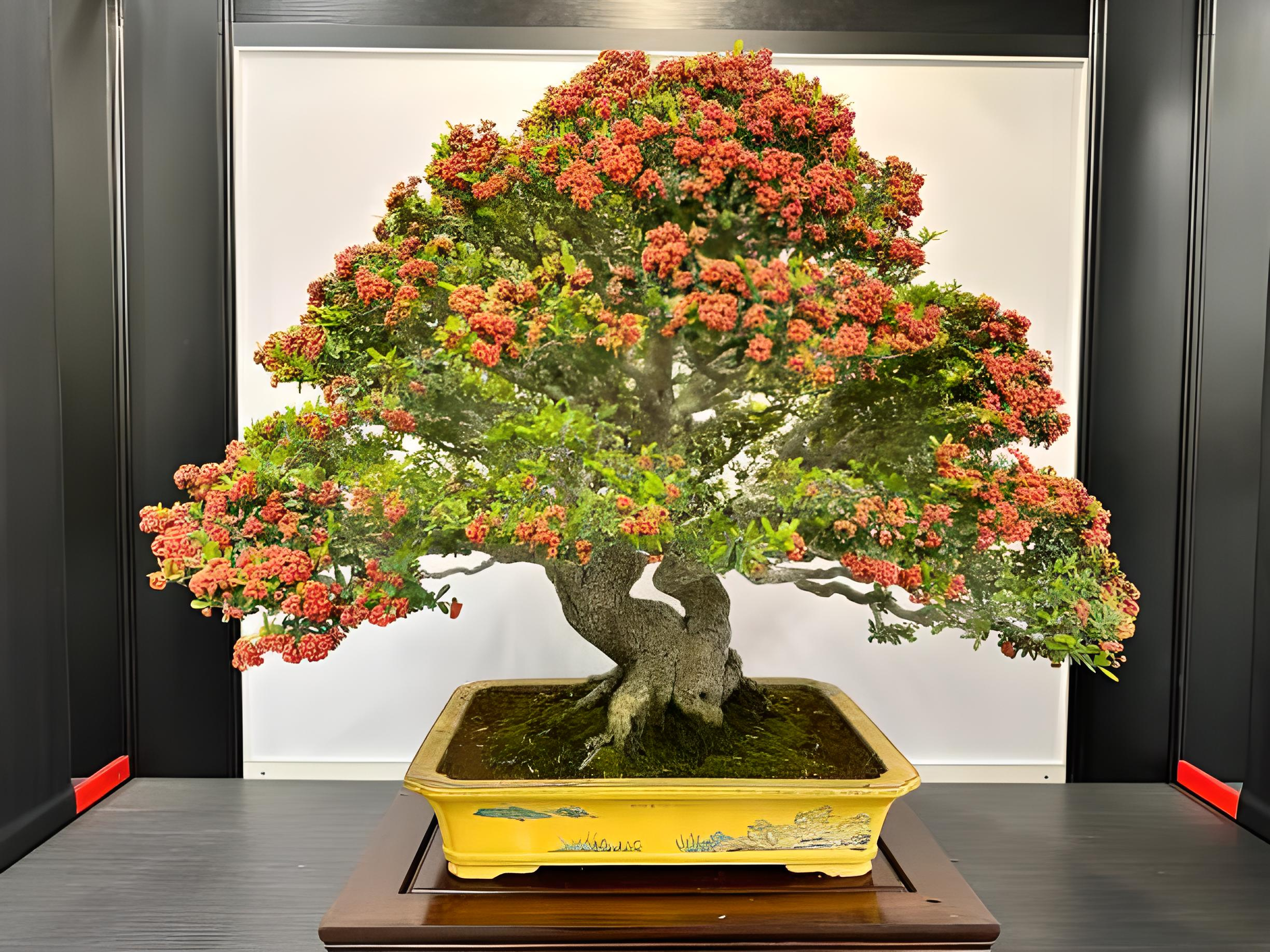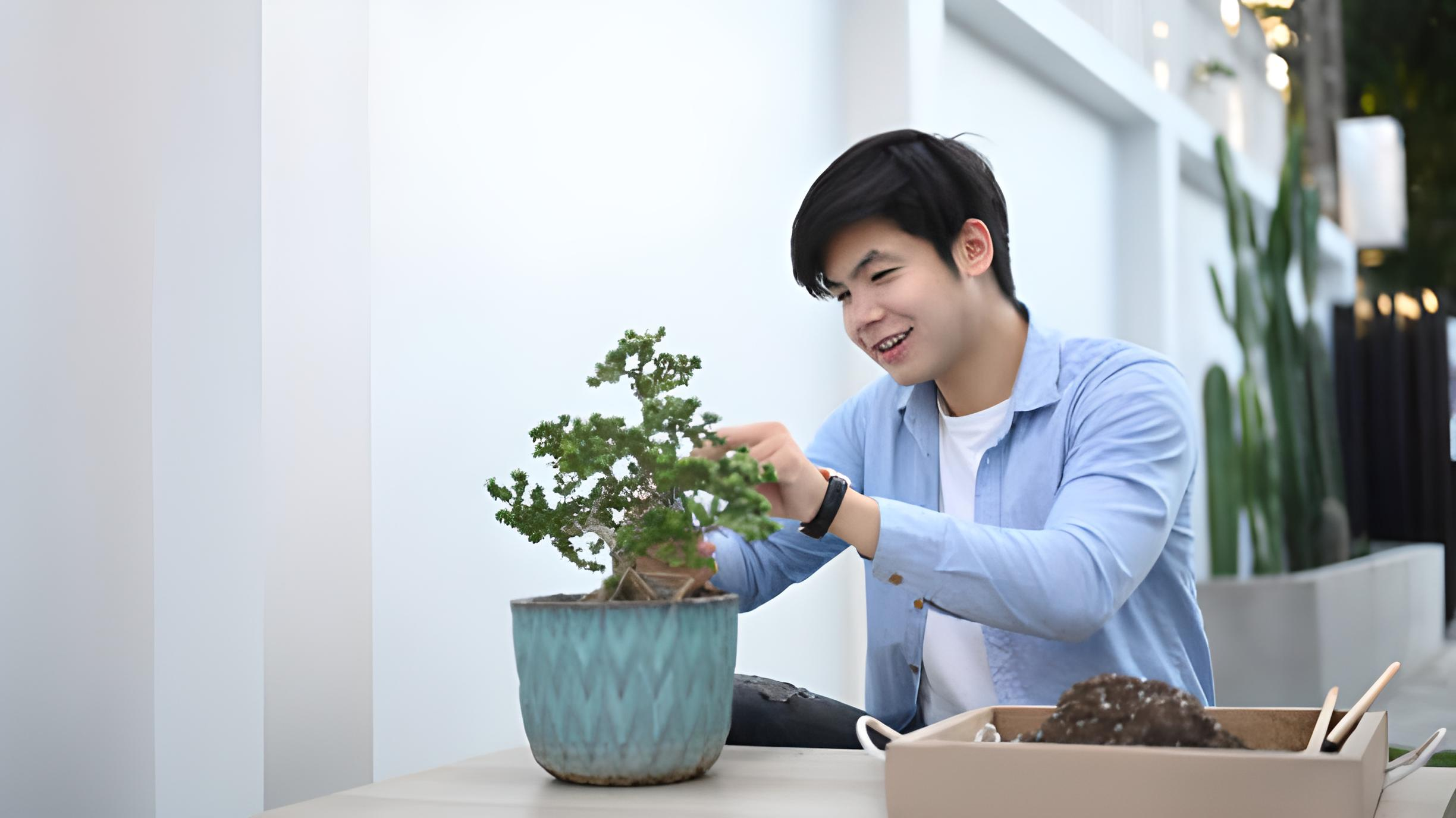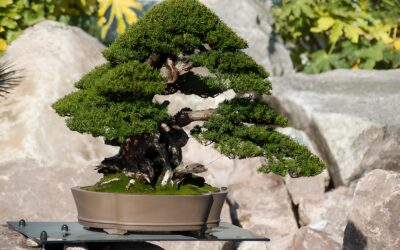The effects of bonsai care on mental health are embodied in the ancient art form of bonsai trees. These miniature trees, thriving both indoors and outdoors, are more than just decorative plants; they represent a therapeutic journey, intertwining art with the natural world.
This unique form of caretaking extends beyond aesthetic value, offering a pathway to improved mental well-being. As we explore bonsai care, we unveil its role in nurturing our mental and physical health, revealing the serene balance it brings to our lives.
The Origin And Essence Of Bonsai

The history of bonsai cultivation is as rich and deep as the effects of bonsai care on mental health. This ancient art form, which began in China and was later refined in Japan, transcends the simple concept of growing miniature trees. Bonsai is a fusion of art and nature, a testament to patience, and a symbol of harmony and balance.
Understanding bonsai requires seeing beyond their physical form as tiny trees. Each bonsai tree is a living sculpture, an expression of the grower’s artistic vision harmonized with the natural growth patterns of the plant.
This process of shaping and nurturing bonsai is not just a physical exercise but a spiritual journey, offering a unique form of bonsai therapy in mental health. It encourages mindfulness and presence, providing a tranquil escape from the fast-paced modern world.
The essence of bonsai lies in the meticulous care and attention it demands — from pruning to watering, each step is a mindful practice, fostering a deep connection between the grower and their natural environment. This connection is a powerful contributor to mental well-being, enhancing the sense of calm and focus.
Therapeutic Effects On Mental Health
The therapeutic effects of bonsai tree care on mental health are profound, offering a unique blend of tranquility and mindfulness. This engaging interaction with nature transcends traditional stress-relief methods, serving as a mental sanctuary. Here are the key mental health benefits of bonsai care:
- Stress Reduction: The peaceful act of tending to a bonsai tree, with its deliberate and careful motions, fosters calmness and serenity, helping to alleviate mental stress and anxiety.
- Improved Focus: The detailed care required by bonsai trees, from precise pruning to positioning for sunlight, enhances concentration and mental clarity, benefiting other areas of life.
- Emotional Regulation: Nurturing a bonsai provides a sense of responsibility and accomplishment, boosting self-esteem and offering a tangible sense of achievement. This interaction aids in stabilizing emotions and promoting a positive mood.
- Mindfulness and Presence: Bonsai care encourages a state of mindfulness, where one’s attention is fully focused on the present task, fostering a deeper connection with the present moment and reducing ruminative thoughts.
- Connection to Nature: Regular interaction with a bonsai tree strengthens one’s connection to the natural environment, promoting a sense of peace and grounding.
- Enhanced Creativity: The artistic aspect of shaping and caring for bonsai stimulates creativity, offering an outlet for artistic expression and innovation.
Bonsai And Physical Well-Being
While the mental health benefits of bonsai care are widely recognized, its contributions to physical well-being are equally significant, albeit more subtle. Bonsai care, often perceived as a gentle and meditative practice, also encompasses physical aspects that positively impact our health.
- Physical Activity and Exercise: Engaging with bonsai involves various physical activities such as repotting, pruning, and adjusting the trees’ position. These tasks, while not strenuous, require manual dexterity and offer a form of light physical exercise. Regularly performing these tasks can enhance hand-eye coordination and maintain fine motor skills.
- Improved Air Quality: Bonsai trees contribute to the natural environment of a living space by purifying the air. As with other indoor plants, bonsai trees absorb carbon dioxide and release oxygen, improving the air quality within homes. This is particularly beneficial for indoor environments, where air circulation can be limited.
- Connection with the Outdoors: For those who keep bonsai trees outdoors, the regular care and maintenance of these plants foster a closer connection with nature. This outdoor interaction encourages physical activity and exposes individuals to fresh air and natural light, which are vital for physical health.
- Stress-Related Physical health Benefits: The stress-reducing effects of bonsai care also contribute to physical health. Reduced stress levels are linked to lower blood pressure, improved immune function, and a decreased risk of several chronic diseases.
Bonsai Care Techniques And Mental Engagement

Delving into the world of bonsai care reveals a fascinating blend of art and mindfulness. Each aspect of bonsai care, from watering to pruning, not only nurtures the tree but also enhances our mental well-being. The effects of bonsai care on mental health are particularly evident in the meticulous and mindful practices involved in bonsai maintenance.
- Watering: This fundamental aspect of bonsai care requires attentiveness and understanding of each tree’s unique needs. The act of watering becomes a meditative practice, fostering a sense of presence and mindfulness.
- Pruning: Pruning is where the artistic aspect of bonsai truly shines. This careful shaping and trimming of the bonsai not only influences its aesthetic appeal but also engages the mind in a deep, therapeutic way. Pruning requires concentration and a creative vision, offering a form of bonsai therapy in mental health.
- Repotting: Although less frequent, repotting a bonsai is a crucial part of its care. This process involves a gentle touch and a keen eye, ensuring the health and longevity of the bonsai. Repotting allows for a deeper connection with the plant, as one becomes intimately involved in its growth and development.
- Monitoring and Adjusting: Regularly observing the bonsai’s growth, soil condition, and overall health is an exercise in mindfulness. This continuous engagement with the bonsai creates a routine that promotes mental focus and attention to detail.
Bonsai Vs. Other Indoor And Outdoor Plants: A Comparative Analysis
When considering the health benefits of plants, bonsai often stands out for its unique advantages over other indoor and outdoor plants. This comparison highlights why bonsai care might offer more powerful mental health benefits.
- Focused Care and Attention: Unlike many other plants that may require minimal interaction, bonsai demands consistent and focused care. This ongoing engagement offers a deeper sense of accomplishment and mental stimulation.
- Artistic Expression: Bonsai cultivation is as much an art form as it is a horticultural practice. This artistic aspect encourages creativity and provides a mental escape, something less emphasized in the care of most other plants.
- Mindfulness and Meditation: The intricate care routines of bonsai, from pruning to wiring, encourage a meditative state. The mindfulness in bonsai care surpasses other plant care, contributing to powerful mental health benefits in a more active manner.
- Long-Term Commitment and Growth: Bonsai trees often require years, even decades, of care, fostering a long-term commitment that can mirror personal growth and resilience, aspects not commonly found in the cultivation of other plants.
- Space and Environment: While other plants can enhance the aesthetics of a space, bonsai transforms an environment into a sanctuary of tranquility. Its presence in a room can significantly alter the ambiance, contributing to mental well-being.
While all plants can positively impact mental health, bonsai offers a unique combination of focused care, artistic expression, mindfulness, and long-term commitment that collectively contribute to more significant mental health benefits.
Starting Your Bonsai Journey
Embarking on a bonsai journey can be a fulfilling and therapeutic experience, especially for those new to this art form. Here are some tips for beginners, emphasizing better mental health benefits of nurturing your own bonsai.
- Choosing the Right Bonsai: Begin by selecting a bonsai that resonates with you. Consider factors like the size of the tree, the type of care it requires, and whether it’s suited for indoor or outdoor growth.
- Learning the Basics: Familiarize yourself with the basic needs of your bonsai – watering, sunlight, pruning, and fertilizing. Understanding these essentials is crucial for the health of your bonsai and your enjoyment in caring for it.
- Creating a Routine: Establish a regular care routine for your bonsai. This practice not only benefits the tree but also helps in establishing a mindful routine for yourself, enhancing your mental well-being.
- Patience and Observation: Bonsai care requires patience. Take time to observe the changes in your tree. This process encourages a slower, more thoughtful approach to life, beneficial for mental health.
- Joining a Community: Consider joining a bonsai community or forum. Sharing experiences and learning from others can enrich your journey and offer support.
- Enjoying the Process: Remember, the journey is as important as the destination. Enjoy each step of the bonsai care process, and appreciate the mental health benefits it brings, including stress reduction and a sense of achievement.
Nurturing a bonsai is more than just a hobby; it’s a journey of personal growth and mental enrichment. As you care for your bonsai, you’ll discover it’s not just the tree that grows – you grow too.
Embrace Bonsai For Mental & Physical Wellness
In embracing bonsai therapy in mental health, we acknowledge the significant effects of bonsai care on mental health. This art form transcends the mere cultivation of miniature trees, offering a pathway to emotional balance and a deeper connection with nature. As you embark on your bonsai journey, resources like Leaves And Soul can provide the necessary tools to enrich this experience.
Let bonsai be a part of your life, enhancing your mental and physical well-being.





0 Comments